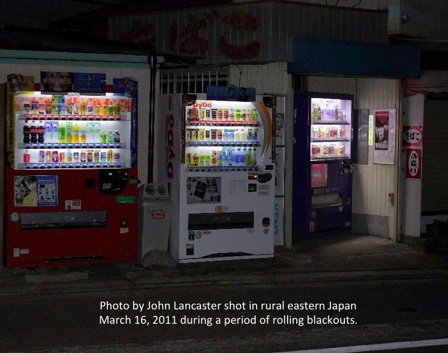Nearly two weeks after the devastating earthquake and tsunami that hit northeast Japan, the Tokyo area suffers power cuts and reduced train service, disrupting people's lives and livelihoods. Meanwhile, millions of power-hungry vending machines continue to hum away 24-hours a day.
For John R. Harris, a Canadian writer who lives 75 kilometers southeast of Tokyo, that was the last straw.
"A week ago I started a campaign asking Coca-Cola to unplug its 1 million vending machines across Japan, because we could see the problem," Harris says. "Here in Japan's Pacific coast countryside, on the edge of the devastation, we're hit with rolling blackouts and curtailed train service. But we're surrounded by literally hundreds of drink machines -- huge refrigerators -- that no one ever seems to use."
Japan is famous for its vending machines, which dispense everything from hot coffee to cold beer and even toothbrushes and girlie magazines. According to the Japan Vending Machine Association (JVMA), in 2009 there were 5.2 million machines nationwide (that averages one machine per 25 Japan residents), including 2.56 million selling drinks - cold and often hot as well. Coca-Cola says that its own Japan network has 980,000 drink machines.
"How much power do these things use?" Harris asks. "It's hard to pin down a definitive answer because Coca-Cola and other industry players are not transparent about power use.

"It's reasonable to assume refrigerated drinks draw more than cigarette machines and more than the 500 watts that new domestic fridges require," Harris says. "But we had a Japanese engineer scour the web all weekend and he couldn't find transparent industry statistics."
With scant official information available, online social media and technical forums in Japan are buzzing with speculation on vending power use.
Engineer Kenichi Mizoguchi, in a post on electric technology site Denki Setsubi no Chishiki to Gijutsu notes that, "With 5 million vending machines each consuming 1 kilowatt, you need 5 million kilowatts of power - more than the 4.69 million kilowatt capacity of all six reactors at Fukushima."
Many observers see JVMA's claim that the average drink machine uses just 1167 kilowatt hours (kWh) per year as less reliable than automakers' fuel-economy claims. Contrast that figure with Drink Shop, a vending-machine sales site that pegs typical drink-machine power needs as "500 watts for the compressor plus 120 watts for lights." Potential buyers are advised that machines require "223.2 kWh per month" or 2,678 kWh annually.
What is clear is that vending power use peaks in summer, when outdoor machines face blazing sun and temperatures above 90°F. And that may be Japan's next nightmare.
Tokyo Electric Power Company (TEPCO) data on capacity vs. demand shows that at 1pm on March 24, consumers were using 95 percent of the troubled utility's 38.5 million kilowatt capacity. And March is a month of low demand. In Japan's furnace-like summer TEPCO reports that peak demand exceeds 60 million kilowatts.
"TEPCO doesn't have another 20 million kilowatts up its sleeve - and I'm not willing to share the pain equally with Coca-Cola," says Harris. His campaign has targeted Coke because "they have more machines than anyone else and they are a smart, global leader in corporate social responsibility." He believes that if Coke proactively slashes power use, rivals like Suntory and Kirin will have to follow. His grassroots campaign, which began with a Facebook group and direct emails to reporters covering the quake, has focused on letters to Coca-Cola executives.
Coca-Cola public relations officers are aware of the campaign. A statement from Coca-Cola Japan, in its entirety, reads:
Our thoughts and prayers are with all of those affected by this devastating situation. It is our Company's role to provide beverages to people to meet their hydration needs. During natural disasters that becomes a critical community need. Therefore, it is important that we continue to operate our vending machines throughout Japan. We are also donating beverages to the government and other relief providers to be supplied free for the relief effort. Overall, this is a contribution of 7 million bottles.
We are fully mindful of our nation's tight electric power supply situation and the government's need for cooperation from the private sector. We are supporting the conservation efforts by providing public service announcements to raise awareness, turning off our neon advertising lights, turning off lights on our vending machines, and our offices are reducing their electric power consumption as much as possible. Thank you for your compassion, your understanding and your interest in helping us meet the challenges of our current situation.
While no official figures are available for the power output of Japan's over five million vending machines, Harris and his team of activists have made some calculations. "The one million kilowatts needed to run Coke machines is close to the rated capacity of the largest reactor at Fukushima: No. 6, which puts out 1.1 million kW," he says. "Especially since half the reactors are usually offline, even the 4.7 million kW total rated capacity of all Fukushima's reactors is not enough to power all 5 million vending machines in Japan."
"We can see absolutely no shortage of drinks in the Tokyo area, Harris says. "And if there was, why not unplug vending machines and supply the convenience stores? Turning off the lights is a red herring because it's refrigeration that's the real power hog - and anyway the Coke machine lights are still on where we live."
To many people in Japan the choice is clear. "If Coke and its rivals were to free up all the power their machines use, we would no longer have rolling power cuts," Harris says. "We would have full train service. Japan's automotive plants could resume production."
